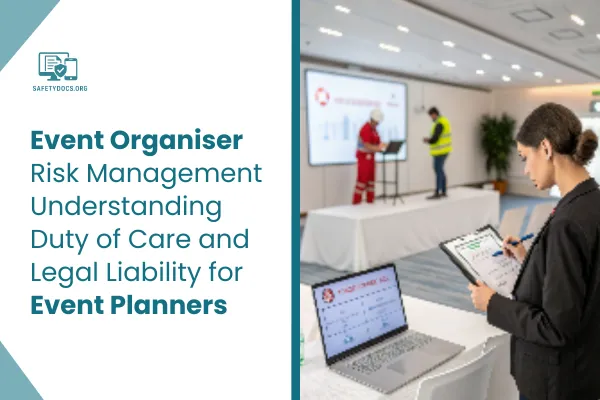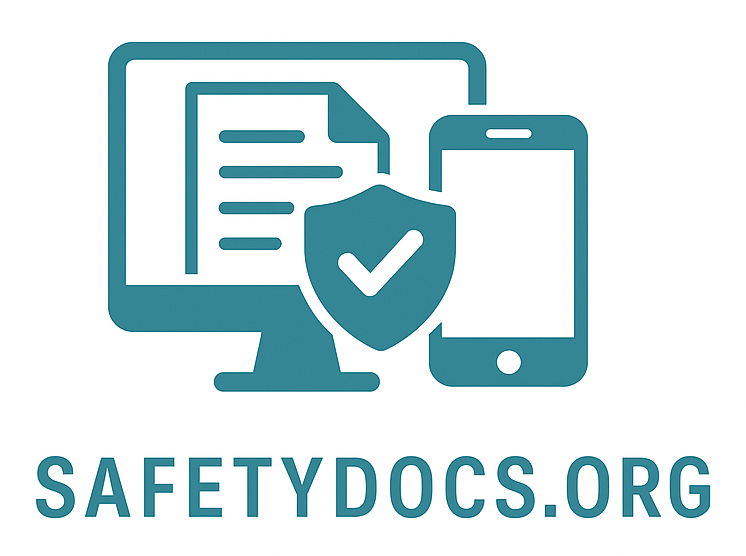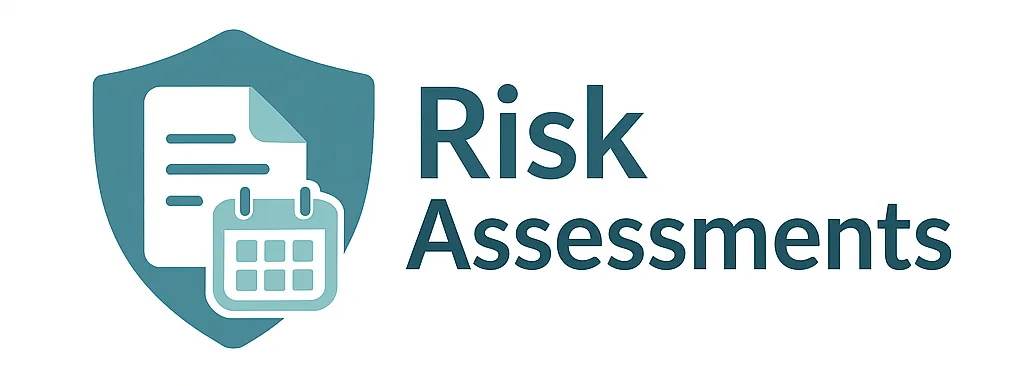
Event Organiser Risk Management: Duty of Care & Legal Liability
Event Organiser Risk Management: Understanding Duty of Care and Legal Liability for Event Planners
Event planning involves countless moving parts, from vendor coordination to guest management. However, one aspect that cannot be overlooked is the legal responsibility every event organiser carries. Understanding the duty of care and legal liability forms the cornerstone of effective event organiser risk management.
When you organise an event, you become legally responsible for the safety and well-being of everyone who attends. This responsibility extends beyond simple venue booking and encompasses comprehensive risk assessment, safety planning, and regulatory compliance.
What Is the Duty of Care in Event Planning?
Duty of care represents the legal obligation event organisers have to take reasonable steps to prevent foreseeable harm to event attendees, staff, and contractors. This responsibility begins the moment someone enters your event space and continues until they safely leave.
The concept of reasonable care means implementing industry-standard safety measures that a competent event professional would typically adopt. Courts evaluate duty of care breaches by comparing your actions against what other experienced event organisers would have done in similar circumstances.
Key Elements of Duty of Care
Your duty of care obligation includes several critical components that directly impact your event organiser risk management strategy.
Physical Safety Requirements: You must ensure the venue meets safety standards, emergency exits remain unobstructed, and potential hazards are identified and controlled. This includes proper lighting, secure staging, and safe walkways.
Health and Hygiene Standards: Food safety protocols, sanitation facilities, and health screening procedures fall under your responsibility. These requirements have become increasingly important following recent health concerns.
Security and Crowd Management Adequate security staffing, crowd control measures, and emergency response procedures protect attendees from both external threats and internal incidents like overcrowding.
Legal Liability Risks for Event Organisers
Event organisers face various legal liability exposures that can result in significant financial and reputational damage. Understanding these risks helps you develop comprehensive protection strategies.
Common Liability Scenarios
Personal injury claims represent the most frequent legal challenge event organisers encounter. Slip and fall accidents, inadequate security incidents, and structural failures can lead to substantial compensation claims.
Property damage liability extends beyond your immediate control. If event activities cause damage to the venue or surrounding areas, you may bear financial responsibility even when contractors perform the work.
Professional negligence claims arise when your planning or execution falls below expected industry standards. These cases often involve inadequate risk assessment, poor vendor selection, or insufficient emergency planning.
Statutory Compliance Requirements
Event organiser risk management must address numerous regulatory requirements that vary by location and event type. Failure to comply with these regulations can result in prosecution, fines, and civil liability.
Work Health and Safety Obligations Most jurisdictions require event organisers to implement workplace health and safety measures protecting both workers and attendees. This includes risk assessments, safe work procedures, and incident reporting systems.
Licensing and Permit Requirements: Various licenses may be required depending on your event activities. Alcohol service, entertainment, food handling, and temporary structure permits each to carry specific compliance obligations.
Insurance Mandates: Many venues and local authorities require minimum insurance coverage levels. Public liability insurance, professional indemnity coverage, and event cancellation protection may be mandatory.
Implementing Effective Risk Management Strategies
Successful event organiser risk management requires systematic identification, assessment, and control of potential risks. This process should begin during initial planning and continue throughout event execution.
Risk Assessment Methodology
Start by conducting comprehensive venue inspections to identify physical hazards, access limitations, and emergency response capabilities. Document all findings and develop specific control measures for each identified risk.
Evaluate your contractor and vendor network thoroughly. Their actions directly impact your liability exposure, making due diligence essential. Verify insurance coverage, safety records, and compliance history before engaging any service provider.
Consider attendee demographics and behavior patterns when assessing risks. Large crowds, alcohol service, and entertainment activities each present unique challenges requiring tailored management approaches.
Documentation and Record Keeping
Proper documentation serves as your primary legal protection and demonstrates due diligence in court proceedings. Safety Docs and similar professional documentation systems help ensure comprehensive record-keeping.
Essential Documentation Requirements: Risk assessment reports, safety procedures, contractor agreements, and incident records form the foundation of your legal protection. These documents prove you took reasonable steps to prevent foreseeable harm.
Incident Management Records. When incidents occur, detailed documentation becomes crucial for both insurance claims and potential legal proceedings. Immediate response actions, witness statements, and remedial measures should be thoroughly recorded.
Training and Communication Records Staff training records, safety briefings, and emergency procedure communications demonstrate your commitment to risk management. These records often prove decisive in legal proceedings.
Insurance and Risk Transfer Strategies
While comprehensive event organiser risk management significantly reduces liability exposure, insurance protection remains essential for events of any size.
Essential Insurance Coverage
Public liability insurance protects against third-party injury and property damage claims arising from your event activities. Coverage limits should reflect potential claim values in your jurisdiction and event size.
Professional indemnity insurance covers claims related to negligent advice, inadequate planning, or professional errors. This protection becomes particularly important for event management consultants and planners.
Event cancellation insurance protects your financial investment when circumstances beyond your control force event postponement or cancellation. Weather, venue problems, and key person unavailability represent common triggering events.
Contractual Risk Transfer
Well-drafted contracts help transfer appropriate risks to other parties while maintaining necessary control over safety standards. Indemnity clauses, insurance requirements, and performance standards should be clearly specified.
Vendor agreements should include comprehensive safety requirements, insurance obligations, and indemnity provisions. These contracts become your primary tool for managing third-party risks.
Emergency Response and Crisis Management
Effective emergency response planning forms a critical component of event organiser risk management. Your response capability directly impacts both attendee safety and legal liability exposure.
Emergency Planning Requirements
Develop detailed emergency response procedures covering medical emergencies, security threats, weather events, and evacuation scenarios. These plans should be specific to your venue and event characteristics.
Coordinate with local emergency services during planning phases. Police, fire, and medical services can provide valuable input on response procedures and resource requirements.
Train all event staff on emergency procedures and communication protocols. Clear command structures and communication channels prevent confusion during crises.
Post-Incident Procedures
When incidents occur, your immediate response actions significantly impact both attendee welfare and legal liability. Preserve evidence, secure witness information, and document response actions thoroughly.
Notify insurance providers promptly following any incident that may result in claims. Delayed notification can compromise coverage and complicate claim resolution.
Moving Forward with Confidence
Understanding duty of care and legal liability empowers event organisers to make informed decisions while protecting both attendees and business interests. Effective risk management creates safer events while reducing legal exposure.
Professional documentation systems and expert guidance help ensure comprehensive compliance with regulatory requirements and industry standards. Safety Docs provides the templates, procedures, and support necessary for effective risk management implementation for event organisers.
Remember that legal requirements continue evolving, and staying current with regulatory changes protects both your events and your business. Regular review and updating of your risk management procedures ensures ongoing compliance and effectiveness.
Ready to strengthen your event risk management approach? Comprehensive documentation templates and expert guidance can transform your safety planning from reactive to proactive, protecting both your attendees and your business interests.
FAQs
1. What happens if someone gets injured at my event?
You may face legal liability if the incident resulted from negligence or failure to meet duty of care standards. Proper documentation and insurance coverage help protect against potential claims.
2. Do I need different insurance for outdoor versus indoor events?
Yes, outdoor events typically require additional coverage for weather-related risks and temporary structures. Your insurance needs vary based on event activities and location-specific exposures.
3. How far in advance should I start planning safety measures?
Safety planning should begin immediately when organizing your event, ideally 3-6 months in advance for larger events. Early planning allows sufficient time for assessments, permits, and staff training.
4. Am I responsible for my contractors' safety mistakes?
You remain responsible for selecting qualified vendors and ensuring they meet safety standards. Proper contractor agreements and insurance verification help protect against third-party liability.
5. What documentation do I legally need to keep after an event?
Retain all safety documentation, incident reports, and insurance records for at least 7 years after your event. These records serve as legal protection for potential claims or compliance requirements.

